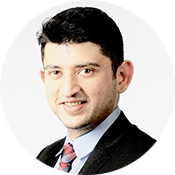Five Things I Wish I Knew at the Beginning of My General Cardiology Training
One fellow’s advice: start at the beginning, plan, learn creatively, accept critique, and maintain your own well-being.

Having just graduated cardiology fellowship and about to embark on the new challenges that lay ahead of me as an interventional cardiology fellow, I can’t help but feel uncomfortable again. Thinking back on the unique challenges general cardiology fellowship posed, though, I know I can feel proud about all that I have navigated. For those just starting out, here are my top five takeaways to set you apart during the first few months of your training.
1. Start With the Core Concepts
The first few months of fellowship can feel daunting and often overwhelming. As if moving to a new city, working in a new hospital system, and taking 24-hour calls were not enough, you are now expected to be a specialist in the field and provide answers to questions you were asking as a medicine resident less than a week ago. Tie that in with interrogation of devices, interpretation of echocardiograms, nuclear imaging, cardiac CT and MRI, EP studies, and angiograms and it’s easy to feel inundated.
I found it useful to start with the core concepts of each subspeciality and work up from there. Most hospitals organize boot camps for fellows that are designed to aid with this, but these may fail to attain the desired effect due to clinical responsibilities, scheduling, and standardization of the content. Instead, capitalize on the plethora of content available online to personalize your learning in ways that target your deficiencies. I found MedMastery (for revision of basic concepts) and the YouTube series by Houston Methodist DeBakey CV Education especially useful.
Remember that only you can know your deficiencies. Instead of hiding them, work actively to overcome them. Most procedures start with access: begin there. If you’ve been away from the clinical setting for a while or didn’t have a lot of hands-on experience as a resident, reach out to senior fellows, critical care, or ER colleagues and ask them to supervise you for the placement of lines. If you have a simulation lab, make sure to familiarize yourself with its procedural resources. With the right guidance, you’ll be well on your way to progressing further.
2. Plan, Plan, Plan
Fellowship can be chaotic, with a lot of things happening in tandem. Learn to stay organized and multitask. Start a negative timer on each subspecialty board so that you’re on top of how you should prioritize your learning. Log what you are doing as you go. There will never be a better time to do it and no better testament to your training.
If you are planning to pursue a subspecialty, know the application time line. Interventional cardiology applications start as early as the beginning of the second year of fellowship and use Electronic Residency Application Service (ERAS) to apply but not to match. Some, like EP and heart failure, only start accepting applicants in the final year of training and work like the cardiology fellowship application with a National Resident Matching Program (NRMP) match, while others like advanced imaging have no standardized timelines.
Allocate time to attend and present at academic conferences. Societal annual scientific sessions are geared towards condensing a lot of learning within a couple of days and provide an excellent opportunity to network.
3. Learn Like It’s 2022
Learning today is very different than it was prepandemic. It is largely free, dynamic, and interactive. Once a week on your commute, say, listen to a cardiology podcast. There are plenty of options to pick from and match your style of learning. My personal favorites are ACCEL Lite, Heart Sounds with Shelley Wood, and the JACC Podcast.
Even if you’re not into posting content on social media, get a Twitter handle and learn to consume the wealth of information out there. From real case discussions to journal clubs and live feeds from academic conferences, there is something to learn for everyone.
Watching the video series put out by the Mayo Clinic called Knowledge to Practice and those from the American Society of Echocardiography are excellent ways to learn the nuances of echocardiography. Also, the snippet-sized videos with a stepwise approach from Emmanouil Brilakis, MD, PhD, can lay the foundation for your cath lab rotations.
4. Be Open to Feedback
Get comfortable not only receiving but also seeking feedback. At the beginning of your rotation, ask your attending about their expectations. Invite feedback midrotation and check in again at the end of your rotation to see if you’ve improved. Stephen R. Covey, author of The 7 Habits of Highly Effective People, said: “It takes humility to seek feedback. It takes wisdom to understand it, analyze it, and appropriately act on it.” Do this with diligence and growth is inevitable.
5. Prioritize Physical and Mental Health
It’s no secret that the burdens of fellowship training can put stress on physical, mental, and social well-being. The opportunities for involvement in clinical work, research, leadership, outreach, and advocacy will be plenty and often seem appealing. Realize that each such opportunities will come at the expense of your personal time. Find your niche in the area that you’re most interested in and get comfortable with saying no. It is important to not get into the groove of using time off as time to catch up on backed-up logs, presentation prep, and board review. Use the time appropriately to tune out from fellowship. Travel and spend time with the ones you love. This will go a long way in restoring work-life balance and energizing you for your time back at work.
Try and stay physically active outside of work by doing what you enjoy. Don’t give up on your Peloton, golf, or hiking just because you’re in training. Be your own physician for once and identify signs of fatigue, burnout, or a decline in your relationships. Prioritize them, request time off, and seek counsel. Also, watch what you eat. Hospital cafeterias are notorious for unhealthy options. Pizza at conferences and donuts in clinic are tempting when running on an empty tank. Weekly meal prepping is a great healthy alternative. Always keep a healthy snack in your white coat pocket. Lastly, try and substitute water for coffee whenever possible. Your body will thank you.
These 3—or maybe 4—years in training are going to be the most rewarding of your life. Own the experience, embrace it, and lean in.
Yuvraj S. Chowdhury, MD, is currently the chief fellow at the SUNY Downstate cardiology fellowship program. He completed his internal…
Read Full Bio




Comments